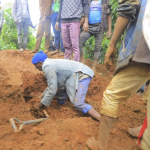The government is seeking Sh300 billion to achieve 100 percent water coverage nationwide within the next six years. Currently, national water coverage stands at 72 percent.
To address this 28 percent deficit, the Ministry of Water has invited the private sector to explore potential investment opportunities through Public Private Partnership (PPP) arrangements. Water Principal Secretary Julius Korir stated that the Universal Water Access Plan requires an estimated Sh1 trillion to achieve comprehensive water coverage by 2030.
“Kenya is at 72 per cent water coverage for the country’s population, within the closest proximity of their homes, and the Ministry’s goal and plan is to have accelerated access to 100 per cent by 2030,” Korir said when he received a delegation of water sector captains of industry and humanitarian organisations from Kenya and the US.
Ahead of a meeting in Kisumu tomorrow, where water stakeholders from both the public and private sectors will gather under the WHOlives initiative to discuss global water challenges, there will be site visits to areas designated for water drilling. The focus will be on using human-powered expertise and Village Drill Hybrid technology.
Mike Anderson, Director of Operations for Village Drill, shared that this technology has already been used to sink two boreholes in Migori and Kisii, with two additional boreholes planned for schools in Kisumu County.
“We have the solution for getting clean water to rural communities. Now faster and more powerful, our proven and patented technology is absolutely the best option for drilling low-cost boreholes,” said Anderson who was accompanied by two investors from the US.
The PS disclosed that in the Universal Water Access Plan, the financing will be split between the government and development partners, with the government covering up to 30% of the costs through regular allocations. Development partners are expected to contribute an additional 30-40% through various forms of support, including loans, grants, and blended financing.
“Now, we hope to get the remaining 30 per cent through inviting the private sector into funding some of the projects, and the government will only be left to provide a guarantee so that they can earn out of that,” he said welcoming initiatives such as WHOlives will be added advantage in the government’s quest to avail water to Kenyans.
“Thus, initiatives such as what we are witnessing here this morning are part of the role of the private sector in ensuring that water coverage is achieved across the country,” noted the PS.
The PS announced that the Ministry has initiated several Public Private Partnership (PPP) projects, with 10 currently under evaluation for awarding to the private sector.
These projects will involve implementing and supplying water to service providers to recover investments. Notable projects include one for Malindi, another for the entire Coastal region, and additional ones in Nairobi and Nakuru. Korir noted that these projects are progressing well, with approximately three expected to be commissioned by the end of the year.
“So the private sector is invited, we have a policy, and a law supporting the PPPs and so the task is for the private sector to pick from the wide variety of projects at our disposal,” he added. WHO lives is planning to sink up to 2000 wells in the country and has applied for a Sh131.5 million ($1 million) grant from the Organisation of the Petroleum Exporting Countries (OPEC) Fund to actualise this investment.

